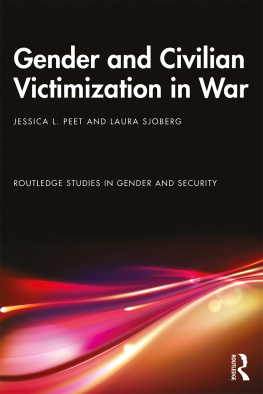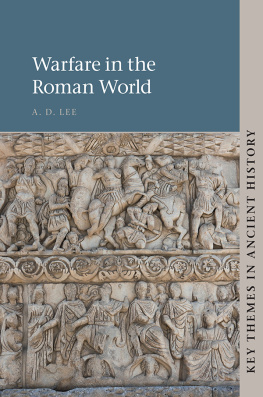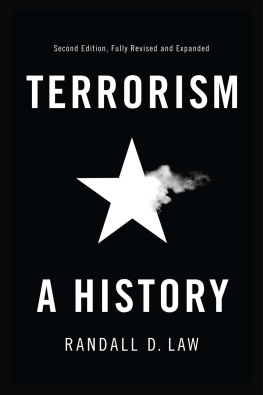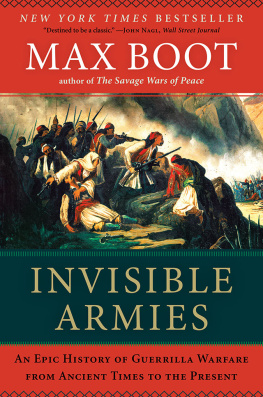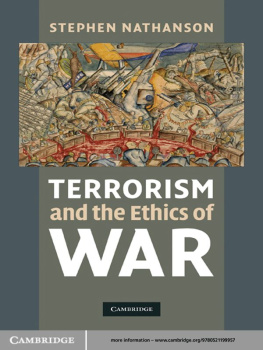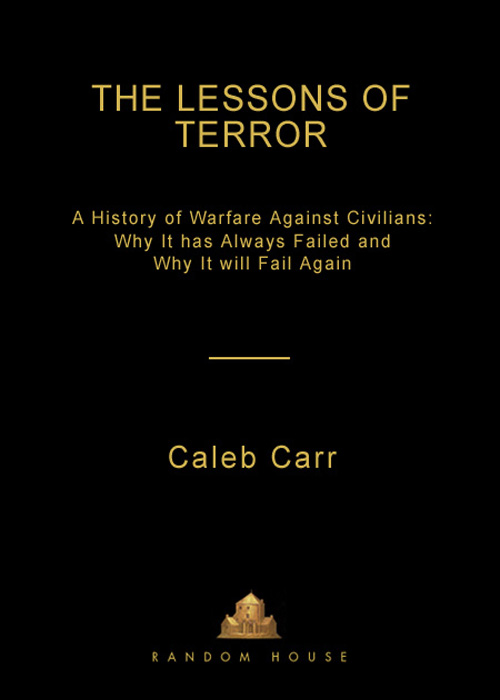
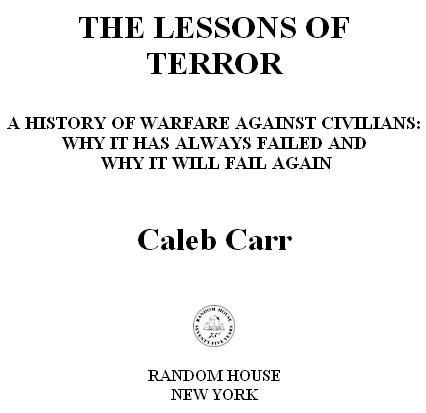
CONTENTS
THIS BOOK IS DEDICATED TO
ANN GODOFF
Friend and Editor,
who understood from the beginning
how important this project was to its author
If a man is slain unjustly, his heir shall be entitled to satisfaction. But let him not carry his vengeance to excess, for his victim is sure to be assisted and avenged.
THE KORAN, 17:33
If an unjust and rapacious conqueror subdues a nation, and forces her to accept hard, ignominious, and insupportable conditions, necessity obliges her to submit: but this apparent tranquility is not a peace; it is an oppression which she endures only so long as she wants the means of shaking it off, and against which men of spirit arise on the first favorable opportunity.
EMMERICH DE VATTEL, The Law of Nations
ACKNOWLEDGMENTS
The ideas contained in this book first took written form in an article I published in 1996 in The World Policy Journal, which at the time was under the stewardship of my friend and mentor James Chace. There is little of value in my life that has not been affected by Jamess wise counsel, although the opinions expressed herein are most certainly mine alone.
My agent, Suzanne Gluck, along with her husband, Tom Dyja, who supplied a title, were staunch supporters of this undertaking from the start, as indeed they have always been.
In the event that the dedication of this volume is in any way ambiguous, allow me to add that Ann Godoff has consistently supported not only the most popular of my undertakings, but those that are most personally important to me; and for that, as well as for her continued friendship, I am deeply grateful.
Also at Random House, I would like to thank Sunshine Lucas, Timothy Mennel, Benjamin Dreyer, James Danly, Casey Hampton, Sarah DImperio, Tom Perry, and the enormously talented Andy Carpenter. Melissa Strickland and Pam de Montmorency provided swift expert research assistance, without which this work would not have been a practical proposition; to them, and to the rest of the remarkable ladies at the Battery Park Research Institute, I offer the deepest affection and appreciation.
My conversations with Ezequiel Viao, who shared the results of his own extensive research as well as his unique insights, were vital.
Oren Jacoby and Jennifer Maguire provided encouragement early on, and I thank them.
My old and trusted friend Rob Cowley agreed to study the manuscript and make suggestions. Once again, no one should infer the opinions expressed herein are anyones but my own; but being able to benefit from the advice of such learned and good-hearted colleagues has always been an invaluable advantage.
This was a particularly tough schedule to meet; and for their help with vital daily details, I thank my family, as well as Arnie Kellar, photographer William von Hartz, Ellen Blain, Tom Pivinski, Perrin Wright, and Bruce Yaffe, M.D. extraordinary.
PROLOGUE
To be emblematic of our age is to bear an evil burden. The twentieth century, scarcely finished, will be remembered as much for its succession of wars and genocides as it will for anything else; and sadly the dawn of the new millennium has brought no end to this horrifying tradition. The first year of the twenty-first century produced images that will likely identify the decade, if not the generation, to come: commercial aircraft, hijacked by agents of extremism, slamming into crowded, unprotected office buildings, bringing about the collapse of those structures and the deaths of thousands of people.
How can we have come to this? How can we have reached a moment in history when men professing to be soldiers serving a cause are capable not only of committing such atrocities but of calling them acts of war?
In this era of ethnic and religious strife we know only too well that human conflict is often inexplicably savage; and yet there were and remain questions about the events of September 11, 2001, that seem to defy even our sadly overdeveloped inurement to horror. The cacophony produced by media sensationalists and television talking heads, a continuous aspect of daily life since the attacks, has done nothing more than crystallize these basic questions, which have gone on to embed themselves in the minds of citizens in every country facing the threat of what has, over the last generation, become known as international terrorism. As the initial assaults in New York, Washington, and Pennsylvania have led to countermeasures and then, inevitably, to further outrages, these deep and troublesome queries have continued to work their way into the vulnerable fiber of the public psychefor these are questions that do not admit of sound-bite solutions, that do not fade even as we see the architects of the massacres arrested, attacked, and killed:
How can we, how can human civilization, possibly have reached such a point?
The immediate causes of the current crisis have been discussed to such a numbing extent that they have attained for many people a somewhat rote quality: again and again stories are disseminated about the grievances and fanaticism of extremists from nations in the Middle East and Asia, about the morally ambiguous economic expansionism of the West, and about the inevitable clash between the two sides religions, cultures, and wildly conflicting conceptions of how people should live. Yet these never-ending and finally overwhelming dissections seem somehow unequal to the events we are living through, never attaining commensurate scope or magnitude.
There is nothing inappropriate about this confusion, this sense of disconnection between lived facts and received commentary. Relatively few people alive today can recall with more than childhood vagueness the last time that civilization faced such a truly epochal moment; and of those few who are old enough to have participated in the struggle against fascism and totalitarianism during the middle of the twentieth century, there are almost certainly none who are actively making executive decisions about the content of television programming or newspaper and magazine articles. Even if there were, television, newspapers, and magazines cannot supply the proper context for studies of what we are experiencing, since they are at best shortsighted records of recent happenings and at worst mere entertainment disguised as thought. Epochal moments belong rightly to history, and it is history that holds the only hope of providing an understanding of the twisted road that has brought us to this frightening pass.
This brief book is intended to provide an introduction to the historical roots of modern international terrorism by placing that phenomenon squarely within the discipline of military history, rather than political science or sociology. It will be proposed that what has to date been viewed and treated as a uniquely modern problem is in fact the current stage in a violent evolution whose origins extend as far back as does human conflict itself: terrorism, in other words, is simply the contemporary name given to, and the modern permutation of, warfare deliberately waged against civilians with the purpose of destroying their will to support either leaders or policies that the agents of such violence find objectionable.
Bloodshed of this kind is quite distinct from what many now label (often with utter disingenuousness) collateral damagethat is, accidental casualties inflicted on civilians by warring military units. Yet like collateral damage, deliberate warfare against civilians has always been with us and cannot be truly understood out of context. Any examination of its historical origins must therefore rest on numerous specific precedents if it is to contribute to a deeper and more productive discussion of our present crisis. That such discussion continues to be necessary at all levels of society, regardless of the day-to-day development of events and policies that affect particular aspects of our current predicament, is indicated by a difficult but ongoing problem: although terrorists themselves must bear the principal culpability for their activities, violent and otherwise, citizens and leaders of the nations and communities in which they have chosen to create their particular form of hell cannot completely escape responsibility, for we have either misunderstood or ignored both the origins and nature of the threat to an extent sufficient to have made the work of its perpetrators far easier.
Next page

